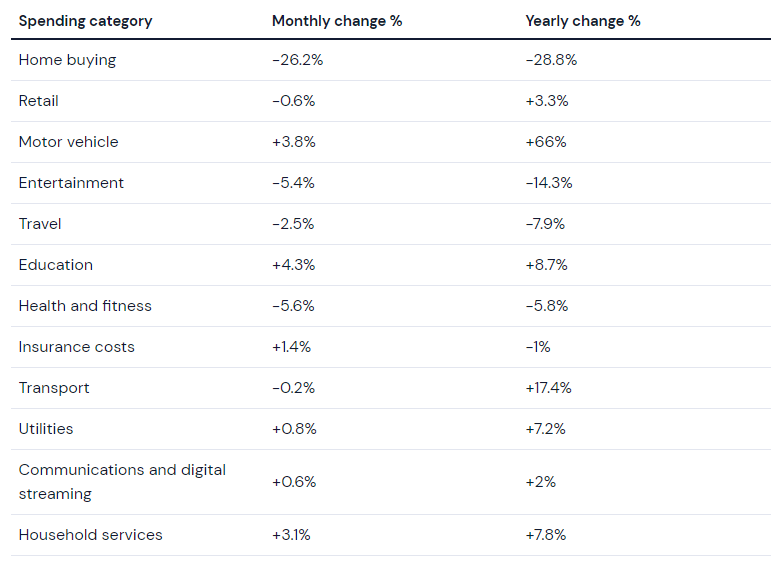The CommBank Household Spending Intentions Index (HSI) decreased by 1.7% in June to 116.
Key points
- CommBank's Household Spending Index declined by 1.7% in June off the back of a lull in home buying intentions (-26.2%).
- With further rate hike/s incoming, CBA expects consumer spending to slow this year and well into 2024.
- ABS data for May revealed discretionary spending remains -0.6% lower compared to May last year.
- The data shows the fall in June was led by a seasonal decline in the home buying (-26.2%), health and fitness (-5.6%), and entertainment (-5.4%) sectors.
Throughout 2023, home buying intentions have been volatile following increases in the cash rate, a lack of stock available on the market, and higher prices.
While retail activity remained muted, strong population growth supported an uptick in spending across grocery stores, supermarkets, and bakeries.
CommBank Chief Economist Stephen Halmarick said the tightening of financial conditions, especially for households with a mortgage or paying rent, continues to constrain consumer spending.
“Although the RBA held interest rates steady in early July, monetary policy in Australia is highly restrictive and this is expected to see ongoing softness in household spending in the months ahead,” Mr Halmarick said.
“Given the lags involved with monetary policy, financial conditions are expected to continue to tighten for many Australian households well into 2024.”

When looking at annual figures, the HSI index moderated further in June, down to 2.4% for the year to June from growth of 4.7% in the year to May.
This is down against the peak of 15.2% to August last year.
Given that annual inflation is currently running at 7% for the March quarter, it means the HSI index is negative for June and the year.
Room in the budget for a car
Compared to June last year, motor vehicle spending was up two thirds or 66% - the strongest spending category in the 12 months to June.
The CBA economics team says supply chain constraints have eased.
"While both the number of motor vehicle transactions and personal loan applications were lower in June, this was more than offset by an increase in Google (NASDAQ:GOOGL) searches related to motor vehicles," they said.
ABS data pointed to a 9.3% rise in personal loan commitments for road vehicles in May, and car sales posted their strongest June month in five years.
This may also be having a flow-on effect to the used car market, with the Moody's Analytics Price Index for used cars declining a further 11.6% in the 12 months to June. They declined 4% over the month.
Moody's economist Catarina Noro expects this to continue.
"Used-vehicle price declines are expected to continue in this downward spell as tighter monetary policy starts to have its desired cooling effect on the economy and as more new vehicles arrive to the market," Ms Noro said.
However used car prices are still up sharply compared to values pre-pandemic.
ABS data points to a different story
ABS data has revealed household spending rose 3.3% in May compared to the same time last year.
While the data contradicts that of CommBank’s, it’s important to note the ABS household spending indicator is released one month behind CommBank’s HSI.
The overall increase in household spending was driven by hotels, cafes, and restaurants (+7.8%), and transport (+7.7%).
ABS Head of Business Indicators Robert Ewing said household spending on discretionary goods was 0.6% lower compared to May last year.
“Driving the fall in discretionary spending over the year was 4.8% less spending on furnishings and household equipment, and 3.4% less on clothing and footwear,” Mr Ewing said.
“While overall household spending rose 3.3%, it was the lowest growth rate since July 2021. This comes as households respond to cost of living pressures.”
Twelve interest rate hikes were playing an important role in reining in consumer spending.
“The combination of higher interest rates and cost of living pressures is leading to a substantial slowing in household spending,” RBA Governor Dr Philip Lowe said in his July post-meeting statement.
The RBA has labelled household spending growth a key source of uncertainty for the economic outlook, and will continue to ”pay close attention to trends in household spending.”
Out of the big-four banks, CommBank continues to remain a ‘lone-wolf,’ forecasting one last 25 basis point hike in August, taking the cash rate to 4.35%.
Meanwhile, NAB, ANZ, and Westpac have pencilled in the RBA to push the cash rate to 4.60% in a bid to reach the central bank’s inflation objectives.
"Consumers wind back spending as family budgets are snipped by rising rates" was originally published on Savings.com.au and was republished with permission.
